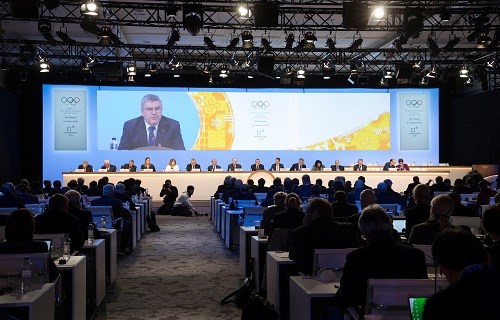Old Wine in New Bottles?
In a document entitled “The New Norm” the International Olympic Committee (IOC) claim that a series of reform measures, could cut as much as $1 billion (€806 million) from the costs of hosting the Summer Olympics and up to $500 million (€403 million) for the Winter Games. The IOC’s plan was presented to its members at its 132nd Session in Pyeongchang, earlier this week.
The “New Norm” indicates that the IOC is increasingly concerned about the costs of hosting the Olympic Games. However, whether the 118 reform measures prove to be effective in curbing future overruns remains to be seen.
Play the Game spoke with Wladimir Andreff, who is a Professor and President of the Scientific Council at the Observatory of sports economy, French Ministry of Sports. When asked to comment on the potential effects of the reform measures presented by the IOC he explains:
“This IOC publication of a New Norm confirms that IOC is concerned with the Olympics too high costs and cost overruns. Overall, my feeling is that the New Norm goes in the right direction, but the question is: how far?”
The past 18 years, the IOC has made repeated attempts to reduce the costs of staging the Olympic games. In 2002, former IOC President, Jacques Rogge established the Olympic Games Study Commission. The Commission was to analyse the scale of the Summer and Winter Games to propose solutions to help manage the cost of hosting the Olympics; and to assess how the Games could be made more streamlined and efficient.
In 2014, the IOC presented “Olympic Agenda 2020” a strategic roadmap aiming at, among other things, “reducing costs for bidding, by decreasing the number of presentations that are allowed and providing a significant financial contribution from the IOC”.
Yet, a study in 2016, by researchers at the University of Oxford, indicated that staging the Olympics continues to be associated with significant cost overruns.
“Downsizing the Games by various means is fine but it is not the first time that the IOC calls for downsizing the Games. Will it be more efficient this time?” asks Andreff.
IOC: “Biggest savings in the history of the Olympic Games”
The “New Norm” presents 118 measures shaped to provide cities with increased flexibility in designing the Games to meet long-term development goals and ensure that host cities receive more assistance from the IOC and the wider Olympic Movement.
“These are the biggest savings in the history of the Olympic Games,” said IOC President, Thomas Bach, according to Inside the Games.
“It is a fundamental rethinking of the organisation of future Games. This will lead to a new norm - from the candidature for and the delivery of the Games through to their legacy,” Bach added.
The largest reductions are expected to come from cuts to competition and training venues, and from cuts to technology and energy, according to the IOC.
Other changes include a “3 year + 4 year” approach to organising the games to decrease the resource needs during the first three years of planning. Designing the games would be the chief focus the first three years followed by a shift to a detailed planning, training and “acting to deliver” in the final four years.
“The modifications presented in ‘The New Norm’ address many challenges associated with bidding for and hosting the Olympic Games,” said IOC Member John Coates, who serves as the Chair of the Executive Steering Committee.
“We examined if the right services and products were provided, if timing of delivery was optimal, and where we can provide additional expertise. What resulted is a robust plan that reduces complexity and costs, while maximising flexibility and partnership,” Coates added.
According to the IOC, “more than 80 of the 118 solutions that have been proposed would result in cost efficiencies without compromising the Olympic experience.”






